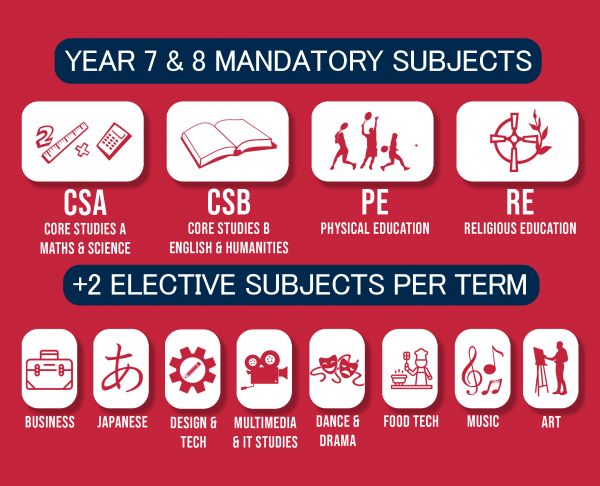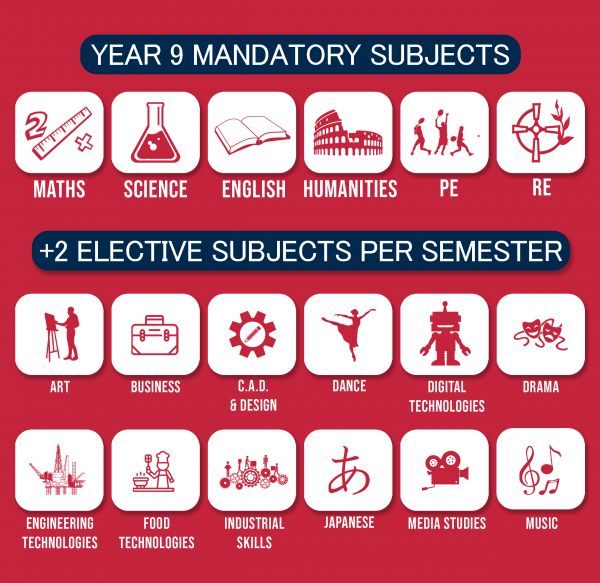Our aim at Shalom College is to provide a holistic education for the students in our care. This is reflected in our decision to include Religious Education in the formal curriculum of the junior school. Religious Education in its broadest sense involves many activities that will contribute to the spiritual formation of our students including: retreats, class masses, visits to the chapel and formal classes.
There are a number of reasons why we study Religion. Some people choose to study Religion because they are searching for meaning and purpose in their lives. Others again may not practice Religion but study Religion as a phenomenon, common to all cultures of history.
In the Middle School the formal Religious Education program covers a broad range of topics including Church history, Scripture, Social Justice, significant people, Catholic Sacraments and Catholic life.
Core subjects studied in Middle School are Mathematics, Science, English, Humanities, Physical Education and Religious Education.
The Core Studies structure reduces the number of teachers timetabled for students in years 7 and 8, allowing for increased contact time for strong teacher-student relationships to develop. Creating a welcoming and safe environment is necessary for emotional, social and academic growth. Core Studies incorporates the learning areas of Mathematics and Science (Core Studies A) as well as English and Humanities (Core Studies B). Subject units are planned to embody the Australian Curriculum, incorporating the General Capabilities and 21st Century Skills (collaboration, communication, critical and creative thinking). Teaching is delivered via a range of instructional approaches to promote learning, satisfy the needs of all learners, emphasise reflective and self-directed learning and challenge students. Regularly there are opportunities for students to work collaboratively to solve authentic problems or challenges, developing an enthusiasm for the world beyond the classroom. Core Studies also allows for the integration of subjects when there is an alignment between the knowledge and understandings, and/or skills required of the separate disciplines.
In Year 9, Mathematics, Science, English and Humanities operate as discrete subject areas often taught by four specialist teachers, which supports students in their transition to the senior years of schooling.
In Year 7 and 8 students participate in two elective subjects per term. In Year 9, students select two elective subjects to study each semester.


Subjects are selected by students entering Years 9 or 10 through the completion of a Subject Selection Form. To complete the form students are required to select in numbered order of preference elective subject areas for Year 9 or semester modules for Year 10 that they are prepared to study. Detailed instructions and examples are included on each form.
Some elective subject areas or semester modules offered initially for selection do not proceed for a variety of reasons. The Principal reserves the right to determine subject viability and class membership based on merit if necessary. However, it is likely that most students will receive their first preferences. Students who do not receive any of their preferences or who have selected a subject area or module that has not proceeded will be consulted and given the opportunity to make a further selection.
We hope that parents and students will collaborate in the choice of elective subjects. Some issues to be considered when choosing subjects for further study are:
A Course Planner can be downloaded from our website here. The course planner is for personal use only and is not submitted as part of the subject selection process.
In addition, a Curriculum Overview can be downloaded here to illustrate how subject areas are developed through the College from Year 8 to Year 12. Students do not have to follow subject area pathways once selected. Most subject areas can tolerate different points of entry and exit by students. However, whilst there are no prerequisites for the study of subjects such as Accounting and Dance in Years 11 and 12 it is useful to have taken related subjects in Years 9 and 10 such as Business Education and Dance respectively. It is also strongly recommended that students who intend to take Senior Japanese select Japanese in Years 9 and 10.
All teaching staff at Shalom College are available to offer advice in relation to subject selection. However, subject specific queries should be directed to individual teachers and Learning Area Coordinators. Queries related to curriculum policy should be directed to the Principal or Assistant to the Principal – Curriculum. The Careers Advisor is also available to assist if necessary.